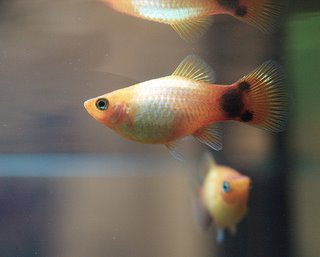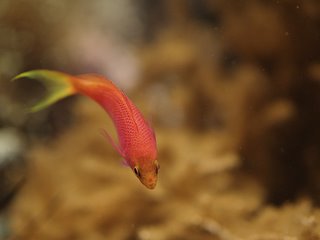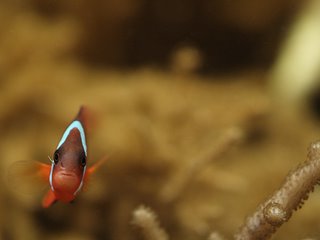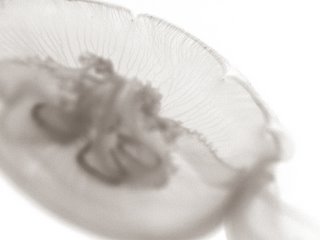On Photography, with particular reference to fish
While I was satisfied with the Emma Rugg's guinea pig's portrait, the pictures of her fish were, in my estimation, decidely mediocre.

Yes, I know. I give the impression of being infallible, omniscient even - but the reality is that I make just as many mistakes as other puppies: I get tired; I forget things; and sometimes I simply just don't think hard enough. "But we fall in order to learn how to pick ourselves up again", sayeth the Batman, and, with that in mind, it was time to re-learn how to photograph fish.
The benevolent powers that be at Amazon.co.uk furnished me with a beautiful Olympus Zuiko Digital 50mm f2 macro lens for a fraction of their usual cost. For those of you who don't know, macro lenses are usually tiny optical miracles.
"...It is difficult to buy a bad macro lens. This is kind of odd in a world where 90% of the lenses sold are bad. Here's my theory: Every day at least one man wakes up and says to himself "I have a 1.5 inch long penis; I think I will buy a big SLR like a pro. But I don't want to spend money on frills like lenses so I'll get a Tokina zoom." However, no man ever wakes up and says to himself "I have a 1.5 inch long penis. I think I will buy a macro lens so that I can make a 1:1 photograph of my penis and distribute this photo from my Web server. But I don't want to spend too much on this lens so I'll try to find a cheap Sigma."
In short, anyone in the market for a macro lens is already fairly sophisticated and quality conscious. If you read USENET then you know that the world is full of people asking "is this $150 Tamron 75-300 zoom as good as a $900 Nikon 300 prime?" Can you blame Tamron/Tokina/Sigma for trying to separate people like this from their $150? But there isn't apparently a big enough collection of fools in the market for macro lenses to support a junky macro lens subcategory."
Hmm... Newly acquired lens in hand, puppyhood intact, I set off for the local aquarium in a sophisticated and quality conscious way.
Macro lenses let you focus on things that are very close. They let you fill the entire frame with tiny objects like baby fish. They're also usually incredibly fast lenses, so if the said fish moves, there'll be less blur. Firing a flasgun at point-blank range is likely to stun a fish, particularly when it's been living in a darkened room/bottom of the sea all its life, so it's best to make as much use of available light as possible (unless you want fish fingers for afters...mmm....)
The trick is to work out where the fish will be, focus on that, and then manually alter focus for the shot. Shots: take many. The result should be some beautifully detailed studies of your chosen fish:

Better - sharper - but still relatively uninteresting, lacking in humour. Still hopeful, I turned my attention to an anemone clown fish that looked a bit like the eponymous hero of Finding Nemo - surely there'd be some comedy value here?

Yup, funny how looking again at something from a different angle makes them all the more interesting...
Ultimately, as much as I like to look at the reflections of crescent moons in the left eyes of nightingales, there's more to photography than stupendous amounts of detail. With my 50mm macro - the optical equivalent of a razorblade - still between my paws, I felt the urge to take dreamy photographs, that at least echoed with something of the alien, submarine world that these fish had been pulled from. Where better to do this than the aquarium's Twilight Zone, with voiceovers by Captain Picard? Here, there were jellyfish which look like spaceships. The original images were upsettingly dark, but a playaround in Photoshop resulted in a series of these:

I love the way you can see the fragile networks of veins running all the way through this jellyfish, and the wispy tendrils that help it navigate the ocean currents. Interesting that, though you could see these in the flesh, they were nowhere to be seen on the original colour image.
My conclusion? Being a good photographer is about having a clear vision of the image you want to capture. Having stonkingly good kit also helps.

Yes, I know. I give the impression of being infallible, omniscient even - but the reality is that I make just as many mistakes as other puppies: I get tired; I forget things; and sometimes I simply just don't think hard enough. "But we fall in order to learn how to pick ourselves up again", sayeth the Batman, and, with that in mind, it was time to re-learn how to photograph fish.
The benevolent powers that be at Amazon.co.uk furnished me with a beautiful Olympus Zuiko Digital 50mm f2 macro lens for a fraction of their usual cost. For those of you who don't know, macro lenses are usually tiny optical miracles.
"...It is difficult to buy a bad macro lens. This is kind of odd in a world where 90% of the lenses sold are bad. Here's my theory: Every day at least one man wakes up and says to himself "I have a 1.5 inch long penis; I think I will buy a big SLR like a pro. But I don't want to spend money on frills like lenses so I'll get a Tokina zoom." However, no man ever wakes up and says to himself "I have a 1.5 inch long penis. I think I will buy a macro lens so that I can make a 1:1 photograph of my penis and distribute this photo from my Web server. But I don't want to spend too much on this lens so I'll try to find a cheap Sigma."
In short, anyone in the market for a macro lens is already fairly sophisticated and quality conscious. If you read USENET then you know that the world is full of people asking "is this $150 Tamron 75-300 zoom as good as a $900 Nikon 300 prime?" Can you blame Tamron/Tokina/Sigma for trying to separate people like this from their $150? But there isn't apparently a big enough collection of fools in the market for macro lenses to support a junky macro lens subcategory."
Hmm... Newly acquired lens in hand, puppyhood intact, I set off for the local aquarium in a sophisticated and quality conscious way.
Macro lenses let you focus on things that are very close. They let you fill the entire frame with tiny objects like baby fish. They're also usually incredibly fast lenses, so if the said fish moves, there'll be less blur. Firing a flasgun at point-blank range is likely to stun a fish, particularly when it's been living in a darkened room/bottom of the sea all its life, so it's best to make as much use of available light as possible (unless you want fish fingers for afters...mmm....)
The trick is to work out where the fish will be, focus on that, and then manually alter focus for the shot. Shots: take many. The result should be some beautifully detailed studies of your chosen fish:

Better - sharper - but still relatively uninteresting, lacking in humour. Still hopeful, I turned my attention to an anemone clown fish that looked a bit like the eponymous hero of Finding Nemo - surely there'd be some comedy value here?

Yup, funny how looking again at something from a different angle makes them all the more interesting...
Ultimately, as much as I like to look at the reflections of crescent moons in the left eyes of nightingales, there's more to photography than stupendous amounts of detail. With my 50mm macro - the optical equivalent of a razorblade - still between my paws, I felt the urge to take dreamy photographs, that at least echoed with something of the alien, submarine world that these fish had been pulled from. Where better to do this than the aquarium's Twilight Zone, with voiceovers by Captain Picard? Here, there were jellyfish which look like spaceships. The original images were upsettingly dark, but a playaround in Photoshop resulted in a series of these:

I love the way you can see the fragile networks of veins running all the way through this jellyfish, and the wispy tendrils that help it navigate the ocean currents. Interesting that, though you could see these in the flesh, they were nowhere to be seen on the original colour image.
My conclusion? Being a good photographer is about having a clear vision of the image you want to capture. Having stonkingly good kit also helps.

0 Comments:
Post a Comment
<< Home